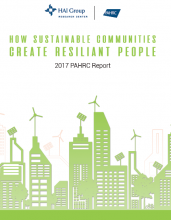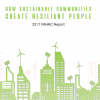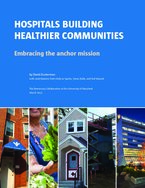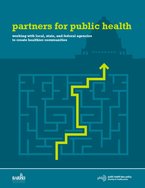0
Case study
Community:
Jul 17, 2018
The South Lincoln Health Impact Assessment (HIA) focuses on the redevelopment master plan for the Denver Housing Authority’s South Lincoln Homes community in downtown Denver. The rapid HIA and masterplan was a four-month process that began in April 2009. The HIA identifies potential health impacts and recommends changes to optimize positive and minimize negative health consequences for the South Lincoln neighborhood. This assessment includes community demographic and socioeconomic information, identified potential health issues, interviews available surveys, and limited body measurement data along with supportive evidence-based research and recommendations that informed the HIA and masterplan design.
Authored by:
Topics: Child welfare, Community development, Disabilities, Dual-generation, Health, Housing, Low-income, Mental health, Metrics, Nutrition, Preventative care, Research, Safety
 Shared by Housing Is
Shared by Housing Is
Housing Is posted a
on Jul 17, 2018
The South Lincoln Health Impact Assessment (HIA) focuses on the redevelopment master plan for the Denver Housing Authority’s South Lincoln Homes community in downtown Denver. The rapid HIA and masterplan was a four-month process that began in April 2009.
0
Research
Community:
Jul 13, 2018
Hospitals Building Healthier Communities aims to provide a resource for hospitals considering adopting or further integrating community engagement and economic development into their daily operations and their core mission.
Authored by:
Topics: Community development, Data sharing, Health, Housing, Low-income, Partnerships, Place-based, Research
 Shared by Housing Is
Shared by Housing Is
Housing Is posted a
on Jul 13, 2018
Hospitals Building Healthier Communities aims to provide a resource for hospitals considering adopting or further integrating community engagement and economic development into their daily operations and their core mission.
0
Case study
Community:
Jul 13, 2018
The Conway Center is a project of a nonprofit housing and services organization, So Others Might Eat, and a federally qualified health center, Unity Health Care, in Washington, DC. This $90 million community development initiative will colocate employment training, health care services, and affordable housing under one roof in Ward 7, an area of DC experiencing high poverty and unemployment, and poor health outcomes. The partnership aims to improve access to affordable rental housing, increase livable-wage job attainment, and connect residents to high-quality health care services. Although still under construction, this partnership highlights how a shared vision among community-serving organizations and funders can result in a comprehensive strategy for improving resident health and well-being
Authored by:
Topics: Community development, Cost effectiveness, Food insecurity, Health, Housing, Low-income, Medicaid / Medicare, Partnerships, Place-based, Stability
 Shared by Housing Is
Shared by Housing Is
Housing Is posted a
on Jul 13, 2018
The Conway Center is a project of a nonprofit housing and services organization, So Others Might Eat, and a federally qualified health center, Unity Health Care, in Washington, DC.
0
Publication
Community:
Jul 13, 2018
This guide is intended to provide information to public health department staff and advocates about the many public agencies that make policy decisions and implement projects related to the physical environment.
Authored by:
Topics: Child welfare, Community development, Education, Exercise, Green, Health, Housing, Legislation & Policy, Place-based, Safety, Smoke-free, Stability, Substance abuse, West Coast
 Shared by Housing Is
Shared by Housing Is
Housing Is posted a
on Jul 13, 2018
This guide is intended to provide information to public health department staff and advocates about the many public agencies that make policy decisions and implement projects related to the physical environment.
0
Case study
Community:
Jul 12, 2018
The Trauma Informed Community Building (TICB) model is based on BRIDGE Housing Corporation’s experience doing community building work over the past five years in the Potrero Terrace and Annex public housing sites in San Francisco, CA.
Authored by:
Topics: Child welfare, Community development, Dual-generation, Family engagement, Low-income, Mental health, Partnerships, Place-based, Preventative care, Research, Safety
 Shared by Housing Is
Shared by Housing Is
Housing Is posted a
on Jul 12, 2018
The Trauma Informed Community Building (TICB) model is based on BRIDGE Housing Corporation’s experience doing community building work over the past five years in the Potrero Terrace and Annex public housing sites in San Francisco, CA.
0
News Article
Community:
May 25, 2018
Community organizations are improving health equity by tackling the cycle of poverty in urban neighborhoods.
Authored by: Jacqui Cook
Topics: Asthma, Child welfare, Community development, Early childhood, Exercise, Family engagement, Health, Low-income, Medicaid / Medicare, Midwest, Nutrition, Obesity, Out-of-school time, Partnerships, Preventative care, Racial inequalities, Research, Safety, Youth
 Shared by Housing Is
Shared by Housing Is
Housing Is posted a
on Jul 11, 2018
Community organizations are improving health equity by tackling the cycle of poverty in urban neighborhoods.
0
Case study
Community:
Jul 10, 2018
Reducing Pediatric Asthma through Home Improvements and Education
Authored by:
Topics: Asthma, Child welfare, Community development, Cost effectiveness, Data sharing, Early childhood, Education, Family engagement, Health, Healthy homes, Housing, Low-income, Medicaid / Medicare, Metrics, Partnerships, Place-based, Preventative care, Research, Safety
 Shared by Housing Is
Shared by Housing Is
Housing Is posted a
on Jul 10, 2018
Reducing Pediatric Asthma through Home Improvements and Education
0
Report
Community:
Jun 1, 2017
Over the past year, the United States Conference of Mayors and the Brookings Institution, along with the Project for Public Spaces have worked together to capture a new model of growth that is emerging in cities and the particular roles that mayors can play.
Authored by: Julie Wagner, Jennifer S. Vey, Steve Davies, and Nathan Storring for Brookings Institute
Topics: Asset building, Community development, Cost effectiveness, Funding, Legislation & Policy, Place-based, Research
 Shared by Housing Is
Shared by Housing Is
Housing Is posted a
on Jul 5, 2018
Julie Wagner, Jennifer S. Vey, Steve Davies, and Nathan Storring for Brookings Institute
Over the past year, the United States Conference of Mayors and the Brookings Institution, along with the Project for Public Spaces have worked together to capture a new model of growth that is emerging in cities and the particular roles that mayors can play.
0
Interactive
Community:
Dec 21, 2017
Authored by: Domenick Lasorsa for the National League of Cities
Topics: Community development, Cost effectiveness, Housing, Legislation & Policy, Low-income, Metrics, Partnerships, Place-based, Research, Stability, Workforce development
 Shared by Housing Is
Shared by Housing Is
Housing Is posted a
on Jul 5, 2018
Domenick Lasorsa for the National League of Cities
0
News Article
Community:
Jan 29, 2018
Chicago’s troubling homicide rate could be significantly reduced through a massive increase in state spending for Chicago schools.
Authored by: Larry Yellen for Fox 32
Topics: Child welfare, Community development, Cost effectiveness, Education, Funding, Legislation & Policy, Low-income, Midwest, Research, Safety, Youth
 Shared by Housing Is
Shared by Housing Is
Housing Is posted a
on Jul 5, 2018
Chicago’s troubling homicide rate could be significantly reduced through a massive increase in state spending for Chicago schools.
0
News Article
Community:
Feb 15, 2018
Authored by: Jon Marcus and Matt Krupnick for The Hechinger Report (originally featured in The Atlantic)
Topics: Community development, Education, Family engagement, Low-income, Midwest, Post-secondary, Research, Workforce development, Youth
 Shared by Housing Is
Shared by Housing Is
Housing Is posted a
on Jul 5, 2018
Jon Marcus and Matt Krupnick for The Hechinger Report (originally featured in The Atlantic)
1
News Article
Community:
Jul 3, 2018
Researchers have shown — and teachers know — that schoolchildren exposed to neighborhood violence can have a tougher time learning, experiencing more stress and depression than their peers growing up in safe neighborhoods. But a Johns Hopkins University sociologist discovered that the consequences of neighborhood violence reach further than previously known, even spilling over to students who come from safe neighborhoods. Using crime and student data from Chicago, Julia Burdick-Will linked exposure to neighborhood violence to a drop in test scores, an effect that extended to students coming from communities that experienced little or no violence.
Authored by: Moriah Balingit for The Washington Post
Topics: Attendance, Child welfare, Community development, Depression, Education, Health, Low-income, Mental health, Midwest, Out-of-school time, Post-secondary, Racial inequalities, Research, Youth
 Shared by Mica O'Brien
Shared by Mica O'Brien
Mica O'Brien posted a
on Jul 3, 2018
Moriah Balingit for The Washington Post
Researchers have shown — and teachers know — that schoolchildren exposed to neighborhood violence can have a tougher time learning, experiencing more stress and depression than their peers growing up in safe neighborhoods.
0
Report
Community:
Nov 1, 2017
Why do some neighborhoods appear able to launch effective local improvement initiatives, while others are more hampered by fragmentation and mistrust? Why can some communities mobilize diverse constituencies to influence public policy, while others cannot? Answers to these questions may be found in the specific patterns of collaboration that form among community organizations, and between these groups, schools, public agencies, and elected officials, according to MDRC, a preeminent social-policy research organization.
Authored by: MDRC
Topics: Asset building, Child welfare, Community development, Data sharing, Dual-generation, Education, Family engagement, Funding, Health, Housing, Legislation & Policy, Low-income, Metrics, Midwest, Mobility, Out-of-school time, Partnerships, Place-based, Preventative care, Research, Safety, Stability, Workforce development, Youth
 Shared by Mica O'Brien
Shared by Mica O'Brien
Mica O'Brien posted a
on Jun 29, 2018
Why do some neighborhoods appear able to launch effective local improvement initiatives, while others are more hampered by fragmentation and mistrust? Why can some communities mobilize diverse constituencies to influence public policy, while others cannot?
1
Video
Community:
May 23, 2018
The Council of Large Public Housing Authorities (CLPHA) hosted The Housing Is Summit in Washington, D.C., on May 3-4, 2018 with 300 partners across the housing, education, and healthcare sectors. Access video recordings of the Summit's keynote speakers (HUD Secretary Ben Carson, John Bridgeland, Matthew Morton), plenary panels (on topics that cut across sectors like anchor institutions, data collaboration, stability, and foundation investments), and select breakout sessions focused on the intersections of housing, education, and health.
Authored by: Council of Large Public Housing Authorities
Topics: Affordable Care Act, Attendance, Child welfare, CLPHA, Community development, Data sharing, Dual-eligibles, Dual-generation, Early childhood, Education, Funding, Grade-level proficiency, Health, Healthy homes, Homelessness, Housing, Legislation & Policy, Low-income, Medicaid / Medicare, Mental health, Metrics, MTW, Out-of-school time, Partnerships, Place-based, Preventative care, Racial inequalities, Research, School-readiness, Seniors, Stability, Substance abuse, Supportive housing, Sustainability, TA, Workforce development, Youth
 Shared by Steve Lucas
Shared by Steve Lucas
Steve Lucas posted a
on May 23, 2018
The Council of Large Public Housing Authorities (CLPHA) hosted The Housing Is Summit in Washington, D.C., on May 3-4, 2018 with 200 partners across the housing, education, and healthcare sectors. The Summit highlighted the ways that we can transform systems to better serve low-income people with two days of plenary speakers/panels, breakout sessions, and caucus discussions geared toward intersectional thinking and ways to take action.
Council of Large Public Housing Authorities
The Council of Large Public Housing Authorities (CLPHA) hosted The Housing Is Summit in Washington, D.C., on May 3-4, 2018 with 300 partners across the housing, education, and healthcare sectors.
0
Webinar
Community:
Feb 21, 2018
Presentation from CLPHA's February 2018 Health Strategic Planning Workshop, co-facilitated with Health Impact Project and Grantmakers in Health
Authored by: CLPHA, Health Impact Project (Pew/RWJF), and Grantmakers in Health
Topics: Affordable Care Act, CLPHA, Community development, Data sharing, Health, Healthy homes, Homelessness, Housing, Medicaid / Medicare, Mental health, Obesity, Partnerships, Place-based, Research, Supportive housing, TA
 Shared by Steve Lucas
Shared by Steve Lucas
Steve Lucas posted a
on Feb 27, 2018
The 2018 CLPHA Health Strategic Planning Workshop, co-facilitated with Health Impact Project (a collaboration of Pew Charitable Trusts and Robert Wood Johnson Foundation) and Grantmakers in Health, convened over 35 communities across the country. Participating teams included internal PHA staff at member agencies who work on health-related initiatives as well as external partners that provide services, education, and other health resources for residents.
CLPHA, Health Impact Project (Pew/RWJF), and Grantmakers in Health
Presentation from CLPHA's February 2018 Health Strategic Planning Workshop, co-facilitated with Health Impact Project and Grantmakers in Health
0
Research
Community:
Jun 2, 2017
How Sustainable Communities Create Resilient People
Authored by: Public and Affordable Housing Research Corporation (PAHRC)
Topics: Community development
 Shared by Keely Stater
Shared by Keely Stater
Keely Stater posted a
on Jun 6, 2017
Public and Affordable Housing Research Corporation (PAHRC)
How Sustainable Communities Create Resilient People
 Shared by Housing Is
on Jul 17, 2018
Shared by Housing Is
on Jul 17, 2018
 Shared by Housing Is
on Jul 13, 2018
Shared by Housing Is
on Jul 13, 2018
 Shared by Housing Is
on Jul 13, 2018
Shared by Housing Is
on Jul 13, 2018
 Shared by Housing Is
on Jul 13, 2018
Shared by Housing Is
on Jul 13, 2018
 Shared by Housing Is
on Jul 12, 2018
Shared by Housing Is
on Jul 12, 2018
 Shared by Housing Is
on Jul 11, 2018
Shared by Housing Is
on Jul 11, 2018
 Shared by Housing Is
on Jul 10, 2018
Shared by Housing Is
on Jul 10, 2018
 Shared by Housing Is
on Jul 5, 2018
Shared by Housing Is
on Jul 5, 2018
 Shared by Housing Is
on Jul 5, 2018
Shared by Housing Is
on Jul 5, 2018
 Shared by Housing Is
on Jul 5, 2018
Shared by Housing Is
on Jul 5, 2018
 Shared by Housing Is
on Jul 5, 2018
Shared by Housing Is
on Jul 5, 2018


 Shared by Steve Lucas
on May 23, 2018
Shared by Steve Lucas
on May 23, 2018
 Shared by Steve Lucas
on Feb 27, 2018
Shared by Steve Lucas
on Feb 27, 2018

 Shared by Keely Stater
on Jun 6, 2017
Shared by Keely Stater
on Jun 6, 2017











